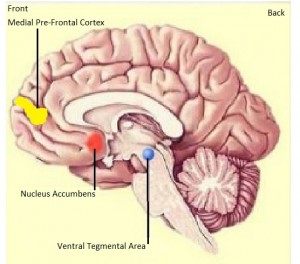[Excerpted from: Scientific American, Mind & Brain, Mind Matters, July 16, 2013]
Why, in a world full of ideas to discover, develop, and discuss, do people spend the majority of their time talking about themselves? Recent research suggests a simple explanation: because it feels good.
In an initial fMRI experiment, researchers compared neural activation during self-disclosure to activation during other-focused communication. Three neural regions stood out. (See the figure at top left showing the brain cut vertically in the middle – the forehead is to the left and the back of the head to the right in the picture).
Self-disclosure resulted in relatively higher levels of activation in areas of the medial prefrontal cortex (MPFC) generally associated with self-related thought. The two remaining regions identified by this experiment, however, had never before been associated with thinking about the self: the nucleus accumbens (NAcc) and the ventral tegmental area (VTA), both parts of the mesolimbic dopamine system.
In a follow up study, answering questions about the self always resulted in greater activation of neural regions associated with motivation and reward (i.e., NAcc, VTA) than answering questions about others, and answering questions publicly always resulted in greater activation of these areas than answering questions privately. Importantly, these effects were additive; both talking about the self and talking to someone else were associated with reward, and doing both produced greater activation in reward-related neural regions than doing either separately. These results suggest that self-disclosure—revealing personal information to others—produces the highest level of activation in neural regions associated with motivation and reward, but that introspection—thinking or talking about the self, in the absence of an audience—also produces a noticeable surge of neural activity in these regions. Talking about the self is intrinsically rewarding, even if no one is listening.


Interesting post, Ramesam. Thanks for making it. I wonder if this is also why we Vedantins love talking about the Self, aka atma, so much. This is the true self. The self in relation to which all the changing body/mind/sense organs attributes of the individual are only incidental, and have no power to change the substantive ‘I.’
Thank you, Dhanya.
You have taken the meaning altogether to a new dimension. It shows your pious heart!
regards,
BTW, Ron is very appreciative of your mails and help. Thanks